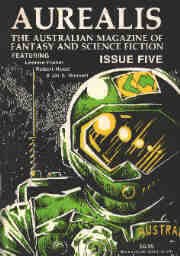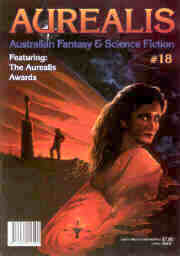Aurealis #66
$3.99
Aurealis #66 delivers a double punch of shivers with a little touch of Australian Gothic in ‘The Sheep King’ from Chris Stabback and the unsettling, unnerving ‘Burning Green’ from O.J. Cade. Patricia O’Neill also concludes her fascinating ‘Go the F**k to Sleep’ article with the usual number of eyebrow-raising moments. With more reviews, articles and interviews, Aurealis #66 proves that Aurealis keeps getting better and better.
From the Cloud — Michael Pryor
The Sheep King — Chris Stabback
Xtreme Science: Go the F**k to Sleep—with zombies — Patricia L O’Neill
Spec Fic short stories are hard to write.
Consider this. When setting out to write Science Fiction or Fantasy, the writer must not only undertake all the standard elements of writing a story—characterisation, setting, plotting and use of language—but must also introduce the reader to a world that could be vastly different from ours.
A short story writer in a more conventional genre can, essentially, take shortcuts. She can assume that the sun will set every day, that things will fall to the ground if dropped, that society will work in a number of well understood ways—and that her readers will take such for granted. Speculative Fiction? Not so much. The world could be ruled by a theocracy where heretics face unimaginable punishments. Gravity could be many times what we are used to. Suns might only set once every few thousand years.
This business is often called Worldbuilding but, in reality, that’s only half the challenge. Once the Speculative Fiction writer has built the world, she must craftily present it to the reader in a way that isn’t ham-fisted or clichéd. The art of sifting in this vital background detail is an underappreciated one. When it’s done deftly, it’s a seamless joy and a tribute to the skill of the writer.
See and appreciate how William Gibson inveigles us into the slick and gritty cyberpunk world of Neuromancer, or how Lois McMaster Bujold subtly lets us know backstory to the Vorkosiverse while we’re concentrating on the adventures of her characters, or how easily we accept time travel in a Connie Willis tale because of the adroit seeding she’s done underneath our notice.
All this is difficult enough to do within the reach of a novel. Doing it within the confines of a short story is remarkable, and yet that’s what our Aurealis writers do again and again.
Here, in this issue, for your delight and amazement, are two fine examples of this extraordinary aspect of writing Speculative Fiction.
From The Sheep King by Chris Stabback
I don’t know if the stranger was alone when it happened, but I’m sure he must have been better equipped than when we saw him. Afterwards, I was lucky enough to touch a part of that massive fleece, and it was so dense in places that it was like stone. There’s no way anything less than a chainsaw could have made a dent in it, as far as I could tell. I imagine him wielding one with calm determination and accuracy carefully stepping only on those parts already shorn. Kicking the disconnected rams and ewes to scare them free and stop them getting entangled again. How long did it take? A day? A week without sleep? I imagine him with a headlamp, working methodically through the night.
From Burning Green by O J Cade
If there was one thing that Julia resented more than the stillbirth, it was that she had allowed her child to be buried rather than cremated. The small grave in the garden—in what passed for the garden—tethered her to the outback more effectively than her work, than Harry’s station. If there had only been an urn, she could have taken it and left: left the red rock and blood sunsets that brought her dreams of haemorrhage and heartbreak.




